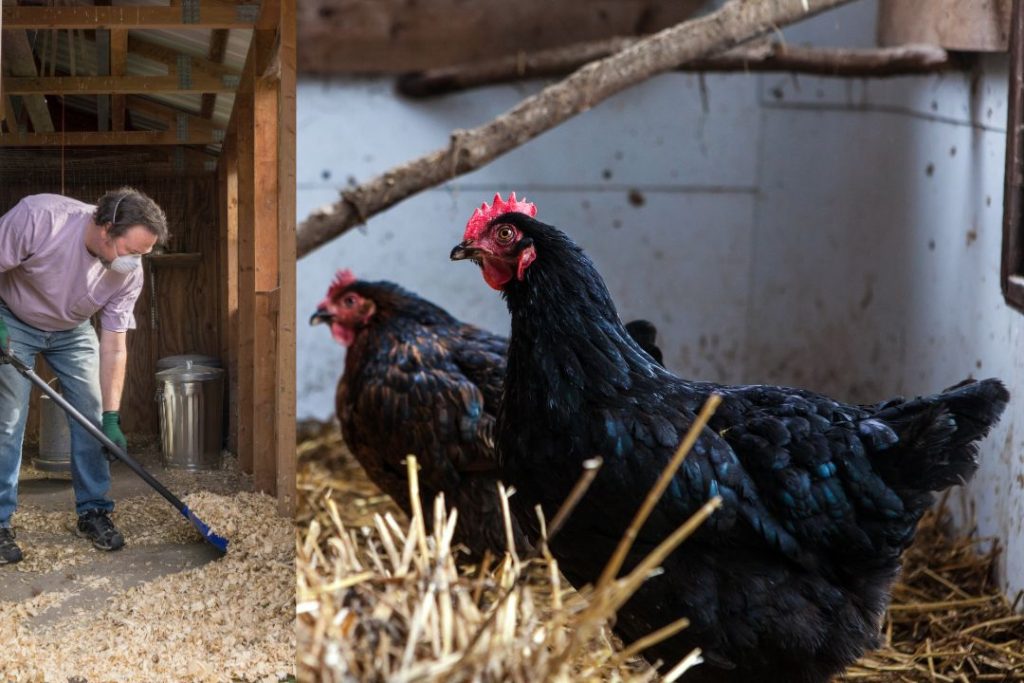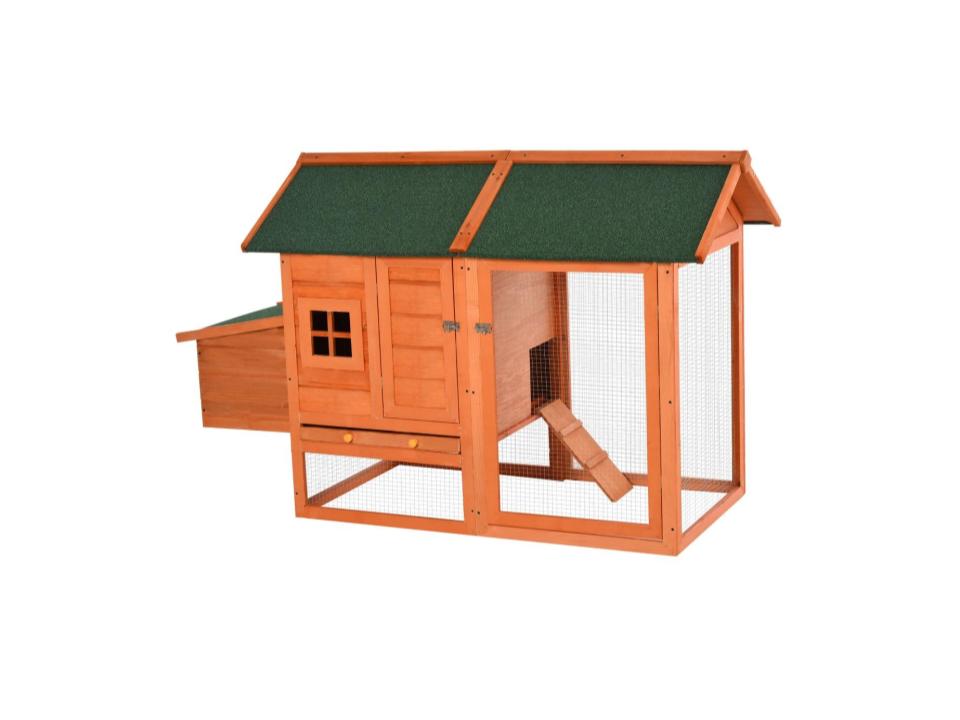Cleaning a chicken coop is essential for maintaining a healthy and thriving flock. However, this seemingly simple task comes with potential dangers that every chicken owner should know.
Cleaning chicken coop dangers are concerning thoughts for chicken keepers. So you can’t avoid it. You must clean your chicken coop to ensure hygiene, comfort, pest prevention, odour control, disease spread prevention and egg quality for your chicken.
However, the potential dangers associated with chicken coop cleaning are fumes and dust exposure, slip and fall hazards, and biosecurity risk. Some more dangers are chemical exposure, handling large coops and stress on chickens.
In this comprehensive guide, we’ll explore the various risks associated with cleaning a chicken coop. Whether you’re a seasoned poultry keeper or a new enthusiast, you must understand these dangers to ensure both you and your chicken’s safety.
Why Do You Need To Clean Your Chicken Coop?
Cleaning a chicken coop may seem like a laborious duty. But it is an important task that should never be disregarded. You and your chicken flock can enjoy numerous benefits through routine cleaning and maintenance.
1. Hygiene
Your chicken’s hygiene and good health are the prime concern. To keep your flock healthy, you need to clean your coop frequently.
Dangerous germs, parasites, and pathogens that can cause various diseases and infections can thrive in your unclean coop. Maintaining a clean coop will lower the illness risk and foster a better living environment for your flock.
2. Comfort
Just like humans, chickens thrive in clean and comfortable surroundings. A tidy coop ensures that your feathered companions have a safe and pleasant place to roost, nest, and spend their days. Comfortable chickens are happier. Happy chickens are more content and productive.
3. Egg Quality
If you’re raising chickens for fresh, delicious eggs, maintaining a clean coop is essential. A dirty environment can lead to soiled eggs, which are unappealing and susceptible to contamination.
Clean nesting boxes and coop bedding contribute to cleaner eggs. It reduces the need for washing and ensuring a higher quality product for your consumption or sale.
4. Pest Prevention
A well-cleaned and organized coop is less attractive to pests like flies, rodents, and mites. Regular cleaning and removal of food scraps and waste discourage these visitors from infesting the coop. Preventing pest infestations protects your chickens from potential health issues and stress.
5. Odor Control
A filthy coop can emit strong and unpleasant odours, making it uncomfortable for chickens and caretakers. Regular cleaning helps control and reduce odours, providing a more pleasant environment for everyone involved.
6. Prevention of Disease Spread
Diseases can quickly spread among chickens in a dirty and crowded coop. Regular cleaning helps break the infection cycle, preventing the rapid spread of diseases from one bird to another.
Quarantining sick birds and maintaining good biosecurity practices further enhance disease prevention.
7. Maintenance of Coop Structure
Cleaning your chicken coop involves inspecting and maintaining its physical structure. Regular checks allow you to identify and address any damage, wear, or weaknesses in the coop’s walls, roof, and flooring.
Timely repairs ensure the safety and longevity of your coop, providing a secure shelter for your chickens.
8. Compliance With Regulations
For those involved in commercial poultry farming or selling eggs, maintaining a clean coop is not just good practice; it is often a legal requirement.
The benefits of a clean coop extend far beyond aesthetics. It directly impacts your chickens’ health, productivity, and happiness.
Cleaning Chicken Coop Dangers – Potential Dangers Of Cleaning
Your flock’s health and welfare depend on keeping your chicken coop clean. But you also need to be aware of any potential hazards while cleaning. Common threats to be on the lookout for include:
1. Exposure to Fumes and Dust
Cleaning agents, like disinfectants and ammonia-based treatments, can be harmful to human health in addition to helping disinfect the coop.
Both hens and individuals who care for them may have respiratory irritation and health issues due to these poisons. Use such cleaning products in a well-ventilated area and avoid direct inhalation.
2. Slip and Fall Hazards
Cleaning a chicken coop involves dealing with various substances, including water, manure, and bedding materials. When these elements mix, they can create a treacherously slippery surface.
Without proper precautions, there is an increased risk of slips and falls during the cleaning process, potentially resulting in injuries to humans and chickens. Wearing appropriate footwear with good traction and taking slow, cautious steps can help reduce this risk.
3. Biosecurity Risks
Improper cleaning practices can compromise the biosecurity of your coop. For example, using the same cleaning tools or equipment for multiple coops or flocks can lead to cross-contamination, facilitating the spread of diseases and infections.
To maintain proper biosecurity, it’s essential to dedicate specific cleaning tools and equipment to each coop. Also, follow a strict cleaning routine to prevent your coop’s contamination.
4. Chemical Exposure
Some cleaning supplies could contain potent chemicals that might be harmful if they touch the skin or eyes. When cleaning, it’s crucial to handle these substances with caution.
5. Stress on Chickens
The cleaning process can be stressful for your chickens. They may be sensitive to changes in their environment and may become anxious or frightened by the presence of unfamiliar people or the disruption of their usual routine.
Minimize stress by working quietly and efficiently and keeping disturbances to a minimum. If possible, try to clean your coop when your chickens are outside so they are not directly exposed to the cleaning activities.
6. Handling Large Coops
Cleaning can be physically demanding for owners of larger chicken coops or commercial poultry facilities.
Handling heavy bedding material, manure, and equipment can strain the body, leading to potential injuries. It’s essential to use proper lifting techniques and, if necessary, enlist the help of others to share the workload.
Best Practices For Safe Cleaning
Now that we’ve identified the potential dangers let’s explore the best practices to ensure safe and effective coop cleaning:
1. Ventilation
Ensure proper ventilation in your coop while cleaning to minimize exposure to fumes and dust. Open your coop’s windows and doors to allow fresh air to circulate.
2. Protective Gear
Wear appropriate protective gear, including gloves, a mask, and eye protection, to shield yourself from harmful substances and prevent potential injuries.
3. Cleaning Schedule
Establish a regular cleaning schedule to prevent excessive buildup of waste. This will make coop cleaning easier and reduce the risk of slip and fall accidents.
4. Use Safe Cleaning Products
Choose cleaning products that are safe for your chickens and the environment. Avoid harsh chemicals and opt for natural, poultry-friendly solutions.
How To Handle Chicken Manure Safely?
Chicken manure is a valuable resource for fertilizing gardens, but it should be handled with care:
1. Composting
Composting chicken manure can be an excellent way to create nutrient-rich fertilizer. However, ensure that the composting process reaches high temperatures to kill potential pathogens.
2. Storage
Avoid the coop and living areas if you plan to store chicken manure. Proper storage prevents odour buildup and potential health hazards.
3. Protective Measures
When handling manure, wear protective clothing and avoid direct contact with your skin. Wash your hands thoroughly after handling it.
How To Prevent Disease Spread From Your Chicken Coop?
Preventing the spread of diseases is paramount in a chicken coop:
- Isolation: Isolate sick chickens from the rest of the flock to prevent the spreading contagious diseases.
- Disinfection: Disinfect equipment and tools after each use, especially if they come into contact with sick birds.
- Quarantine Period: Introduce new birds to your flock only after quarantine to ensure they are healthy and disease-free.
Frequently Asked Questions
Can I Clean the Coop with My Chickens Inside?
Removing your chickens from the coop during cleaning is best to prevent stress and potential injuries.
How Often Should I Clean the Coop?
Cleaning frequency depends on your coop size and the number of chickens. Weekly cleaning is a good starting point.
Can I Use Bleach for Coop Cleaning?
Bleach can be effective for disinfection, but it should be used cautiously and properly diluted to avoid harmful fumes.
What Do I Do With Old Bedding?
Used bedding can be composted or used as mulch in the garden, provided it’s free from chemicals and medications.
End Note
Cleaning a chicken coop is a vital responsibility for poultry keepers. But it comes with potential dangers or simply cleaning chicken coop dangers that must be addressed.
By understanding and implementing safe cleaning practices, you can ensure the well-being of both your chickens and yourself. Proper ventilation, protective gear, and handling manure can go a long way in minimizing risks.
Moreover, practicing good biosecurity and disease prevention measures will help maintain a healthy and thriving flock.



